Hi Susun,
I’ve been living with chronic illness for a while now and struggle with depression on and off. Some days I can manage it better than others. As with others I know, the winter months are the hardest time of year. What do you recommend for managing depression naturally? Thank you for your time.
Susun’s response:
Winter time is depression time for many women. Perhaps it is harder to look at the bright side when days are short, perhaps the holidays and family demands take their toll on us. Of course, depression can also be triggered by lack of thyroid hormone and by use of steroids, high blood pressure drugs, and ERT/HRT.
But most often the cause of depression is the belief (valid or not) that nothing you do makes any difference. Victimization and poverty lock women into depression. More than one-third of all American women have been victims of sexual or physical abuse; and women make up more than two-thirds of all Americans who live below poverty level. Yet our culture frowns on women who express their anger. No wonder depression is a woman’s issue.
“Look here,” Grandmother Growth motions to you as she spreads her story blanket at your feet. “See how depression is deeply woven with anger and grief. When our need for reliable, joyous intimacy is frustrated, and expression of our frustration would endanger us, depression comes and protects us. When there is no way to deal effectively with situations that enrage us, depression comes and helps us quiet our violent impulses.”
“Depression is not an easy companion on your journey, but she knows much about life. In her bundle, she carries the anger you have carefully frozen with frigid blasts of fear and kept nourished with your pain. She carries your wholeness. She carries your ability to go beyond the pain, your ability to allow your rage to move you into health. She carries your wholeness. Will you let her teach you?”
Wise Woman remedies don’t seek to eliminate our feelings, or turn “negative” ones into “positive” ones, but to help us incorporate all of our feelings into our wholeness / health / holiness.
Welcome the dark. Cherish the deepness. Give yourself over to a day or two of doing nothing. Then, get up, no matter how bad you feel. Set a goal for the day and meet it. Smile—it releases brain chemicals that make you feel good. Smile no matter what. Do it as an exercise. Hate it while you do it. But SMILE!
Homeopathic remedies include Arum metallicum, for women with frequent thoughts of suicide who feel cut off from love and joy; and Sepia, for women who are disinterested in everything, angry at family and friends, and just want to be left alone.
It’s more than idle chatter that depression comes with gray skies and happiness with sunny ones. For emotional health (and strong bones) get 15 minutes of sunlight on your uncovered eyelids (outside, no glasses, no contacts) daily. If you can’t get out (or if the sun doesn’t cooperate), wake up 1-2 hours earlier than usual. (You can stay in bed, but keep those eyes open.)
Sing the blues; dance ‘em too. Women have depended on songs and dances to carry them out of depression for centuries. Dance therapy is more effective than talk therapy for reaching and healing traumatic experiences. Even a single session may have a dramatic effect.
Find your rage and write it down. Get a massage and let the anger move out of the muscles. Volunteer to help change something you are upset about, even a small thing.
St. Joan’s / John’s wort (Hypericum perforatum) lives in very sunny locations and blooms at summer solstice. I call it bottled sunshine. A dropperful of the bright red tincture taken 1-3 times daily has helped many women relieve SAD (seasonal affective disorder), move through grief, ease the physical pain of depression, and walk on the sunny side! CAUTION: Hypericum in capsules is not as effective and can cause unwanted side effects.
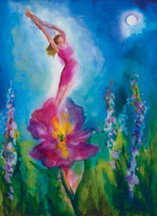
• Oatstraw infusion (not tea, tincture, or capsules) has been an ally for depressed women since earliest times. Gentle Avena nourishes the nerves and helps you remember why life is worth living. To make an infusion: Brew one ounce by weight of dried herb (that’s a cup by volume) in a quart jar filled to the top with boiling water. Steep for at least four hours, then strain and refrigerate your infusion. Drink as many cups a day as you wish. Or make an oatstraw bath by adding two quarts of infusion to your bath water.
Garden sage (Salvia) is an ancient ally for emotionally-distressed women. In some societies, only crones were allowed to drink the brew made from the nubbly leaves (at least partly because it delays menses and dries up breast milk). Make an infusion (see oatstraw); drink by mixing a few spoonfuls of the dense brew into hot water or warm milk; add honey to taste. The undiluted infusion keeps for weeks refrigerated.
Behavioral and interpersonal therapies are as effective as drugs in relieving depression. Not only that, two-thirds of those who simply read about therapy improve significantly.
Thirty minutes of aerobic exercise, especially soon after awakening, has been shown to help women whose depression is resistant to all treatments, including drugs.
Sleep less. If you are a woman who overproduces a normal depression-causing substance which accompanies sleep you will feel depressed and often find it difficult to wake up. Sleeping more will only compound the problem. Instead, stay up all night once a week. If you can’t cope with no sleep, even mild sleep deprivation (such as sleeping five hours or less for two nights in a row) dramatically decreases depressive symptoms in some people.
Low levels of calcium, zinc, and B vitamins are associated with depression. Get more by eating more cheese and yogurt, more garlic and mushrooms, more whole grains and beans.
Lack of vitamin B12 doubles the risk of severe depression for older women. This critical nutrient, found only in animal products, is destroyed by tofu and soy beverage. Drink real milk, eat real cheese, eat meat at least occasionally and watch your mood improve :)
1600 mg of SAM-e (A-adenosylmethionine) relieved the symptoms of moderate depression as well as imipramine, but no better than Hypericum (St. John’s wort). CAUTION: Of the brands tested by Consumer Reports, only Natrol, Nature Made, TwinLab, and GNC passed all tests.
Avoid hormone replacement—ERT/HRT—if you’re depressed; it’s strongly associated with an increase in suicide attempts.
Women who used to take lithium say they have gradually switched over to skullcap (Scutellaria lateriflora). A dose of infusion is one cup/250 ml or more per day; of fresh plant tincture is 5-8 drops twice a day; of the dried plant tincture is a dropperful/1 ml several times a day. CAUTION: Skullcap can make you sleepy.
For women whose depression resists all other therapies, electro-convulsive treatments (ECT), previously known as shock treatments, have been updated with special care taken to minimize harm. The women I spoke with who were using ECT told me it was incredibly effective, and the side-effects, including severe memory loss, acceptable to them.
From doing nothing, to ECT, the range of remedies available to depressed women is enormous. To help you choose wisely, these effective, simple Wise Woman remedies are in order of safety: the safest remedies first, and the most dangerous ones last. This excerpt is a shortened version of the depression section in New Menopausal Years, the Wise Woman Way.
Green blessings, Susun Weed
photos: Wise Woman Spiral ©iStockphoto.com / Chuck Spidell |
Dancing Diva ©1995
Melissa Harris
-
Susun S. Weed has no official diplomas of any kind; she left high school in her junior year to pursue studies in mathematics and artificial intelligence at UCLA and she left college in her junior year to pursue life.
Susun began studying herbal medicine in 1965 when she was living in Manhattan while pregnant with her daughter, Justine Adelaide Swede.
She wrote her first book -- Wise Woman Herbal for the Childbearing Year (now in its 30th printing) -- in 1985 and published it as the first title of Ash Tree Publishing in 1986.
It was followed by Healing Wise (1989), New Menopausal Years the Wise Woman Way (1992 and revised in 2002), Breast Cancer? Breast Health! The Wise Woman Way (1996), Down There: Sexual and Reproductive Health the Wise Woman Way (2011), Abundantly Well - Seven Medicines (2019).
In addition to her writing, Ms Weed trains apprentices, oversees the work of more than 300 correspondence course students, coordinates the activities of the Wise Woman Center, and is a High Priestess of Dianic Wicca, a member of the Sisterhood of the Shields, and a Peace Elder.
Susun Weed is a contributor to the Routledge International Encyclopedia of Women's Studies, peer- reviewed journals, and popular magazines, including a regular column in Sagewoman.
Her worldwide teaching schedule encompasses herbal medicine, ethnobotany, pharmacognosy, psychology of healing, ecoherbalism, nutrition, and women's health issues and her venues include medical schools, hospital wellness centers, breast cancer centers, midwifery schools, naturopathic colleges, and shamanic training centers, as well as many conferences.
Susun appears on many television and radio shows, including National Public Radio and NBC News.
View all posts


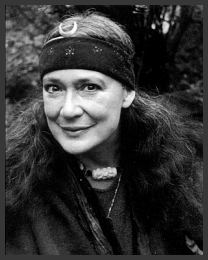
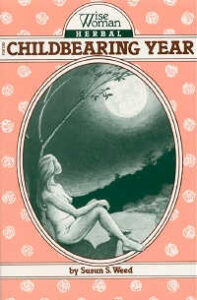
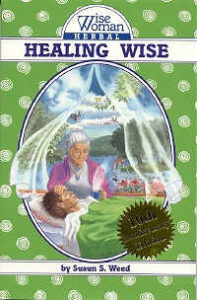
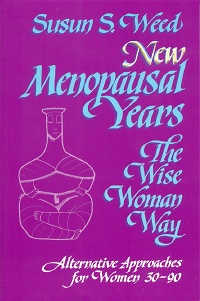
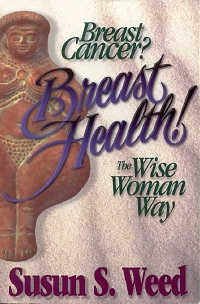
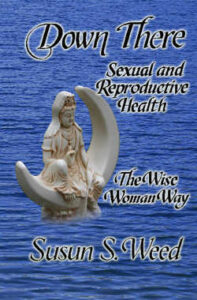
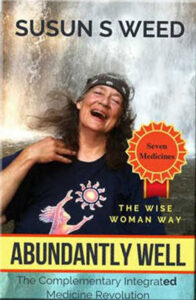



0 Comments